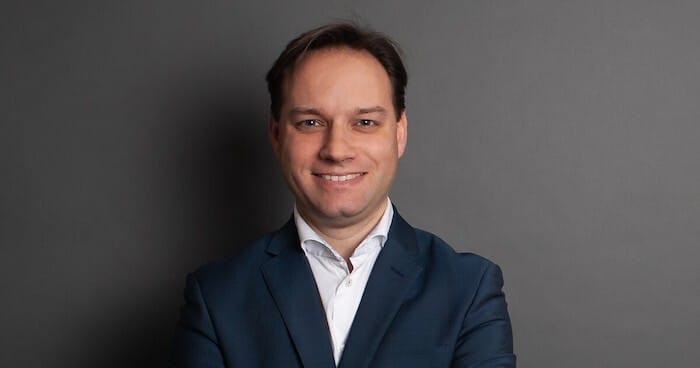Richard McMorris, who heads Bird & Bird’s newly formed Digital Rights & Assets practice group, highlights the qualities he thinks are required to succeed

Technology, communications and media firm Bird & Bird launched its Digital Rights & Assets group less than a year ago, headed by partner Richard McMorris.
The cross-practice, international group helps clients create and manage their digital rights and assets and relevant technologies — basically anything in a digital format; data, video, audio, graphics, analytics, blockchain technologies, digital currencies and non-fungible tokens, artificial intelligence (AI), the cloud ecosystem and digital security.
It helps start-ups in the early stages of setting up their businesses as well as large, established multinationals, so has a broad range of clients. There is no typical day or week — “it’s everything, a mixed bag” — but to give a flavour of the type of work, regulatory advice is increasingly important; there’s a lot of intellectual property work as clients want to know what they can and can’t do and whether someone else is infringing their rights; there’s transactional work, where companies are acquiring assets or exploiting assets; and tax work — as businesses are increasingly digital, the question of where a business is located for tax purposes has become more complex.
“Clients are increasingly asking ‘how to’ questions rather than legal questions — ‘we want to do X, how do we do that?’,” McMorris explains. “Finding the way forward is the most important goal, rather than just advising on the law itself — which is something I like about this area of work. Collaboration between lawyers of different disciplines is increasing. We’ve looked at the best way to serve our clients’ needs and decided to break down practice barriers, and have set-up a new ‘cross-practice’ group focused on digital rights and assets.”
It’s a fast-moving and exciting practice, where lawyers need to use their initiative to cover gaps in the law and find practical solutions to new problems. Consequently, creativity and curiosity are valuable qualities to possess if you want to work in this field.
“To be creative is increasingly important,” says McMorris. “The process of problem-solving is highly creative — you need to be able to find ways around the issue. I think being curious is a skill, i.e. always testing and enquiring. I think that’s very important generally. Clients are now often asking you to imagine something that may not yet exist and so the ability to see from another perspective and to visualise from different angles what the client intends is very valuable. And the more traditional skills of being logical, independent and methodical also remain vitally important.”
Most of the legal tools used to try to protect digital content have been around for a long time, for example, copyright. “We are used to the idea that most content is protected by copyright, so misuse or copying can be stopped or monetised,” McMorris says. “But with, say, data the position is often different — in particular large databases, especially those produced by machines. Copyright and other IP regimes often don’t protect data so a client may need to rely on trade secrets or breach of confidence laws instead. The really interesting challenge is to work out how to use regimes that were not necessarily intended for that purpose. There are quite big holes in the law and it will be interesting to see how the EU and other governmental bodies tackle this.”
Large pieces of regulation are in the pipeline from the EU and elsewhere, such as the EU’s proposed Digital Services Act and Digital Market Act, and new Acts focused specifically on data, but governments around the world are approaching digital data differently. Russia and China, for example, are increasingly trying to lock it down and stop it being exported whereas UK, EU and US policy is to liberalise data where possible, McMorris explains.
Given the speed with which new technologies emerge, it’s the nature of the game that regulators will always be playing catch-up to some extent. This explains why McMorris highlights another useful skill — to be good with change.
“Some people like predictability but others are comfortable with constant change. I would say I fall into the latter category,” he says.
McMorris, who cites “composer” as his ideal alternative career, has written classical music and jazz. He studied law at Birmingham University, followed by the Legal Practice Course at the College of Law, York. He worked at media and technology law firm Wiggin before moving in-house as general counsel and head of corporate development at a FTSE-listed international digital media company, and back into private practice at Bird & Bird — a career move he reflects on very positively.
“I was 13 and a half years qualified when I went in-house so fairly experienced but my time working in-house was still the formative period of my career,” he says. “I was at Wiggin before, working alongside some really talented lawyers. I gained a grasp of law as a business quite quickly but there is no question that my time in-house made me the professional that I am now. I would advise people to try to get real experience client-side — through secondments if they don’t want to change job. I learned an awful lot from being on the other side of the fence.”
For those interested in a career in the dynamic area of digital assets, therefore, the qualities to cultivate are creativity, curiosity and being good with change; the job involves constant collaboration with professionals in other disciplines to problem-solve; it’s vital to understand each of your client’s businesses and goals; and you should seek out opportunities to gain in-house experience wherever you can.
Richard McMorris will be speaking alongside other Bird & Bird lawyers at ‘The digital economy — with Bird & Bird’, a virtual student event taking place this week, on Wednesday 15 September. You can apply to attend the event, which is free, now.


